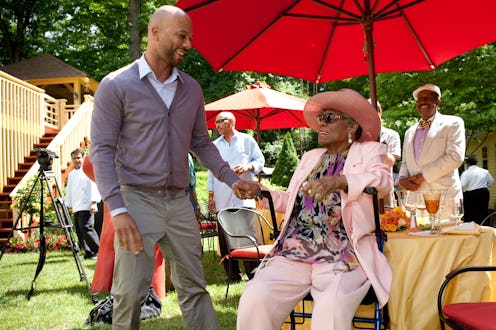Entertainment
How Maya Angelou Influenced Tupac & Hip-Hop
With the passing of legendary poet and author Maya Angelou, thoughts and reflections are rightly focusing on her seminal autobiography, I Know Why the Caged Bird Sings, her activism, and her influence on American poetry. Angelou is best known for her work as a writer, activist, and a filmmaker, but what's less widely appreciated is that Angelou was also a strident collaborator (and critic of) hip-hop. Throughout the genre's evolution, Angelou has been influencing hip-hop culture.
One could argue that Angelou's impact on hip-hop truly began in 1993, when she composed poems for the film Poetic Justice , and appeared in a cameo role within the romantic film, headlined by Janet Jackson and Tupac Shakur.
According to an interview with the CBC's George Stroumboulopoulos, Angelou first spoke with Tupac after he was involved in a fight on set. She pulled him aside to calm down the mercurial rapper and to impart wisdom on his own significance as a cultural force. Angelou told the CBC:
I didn't know who he was," Angelou recalls. "I heard he was in a big row with another young man and so I said to him, 'May I speak to you?' And he was cursing, whoo, 'I wouldn't give a...!' I said, 'I understand that. However, let me speak to you.' And finally I said, 'When was the last time anyone told you how important you are? Did you know our people stood on auction blocks, were sold, bought and sold, did you know so that you could stay alive today?'
Finally he heard me and stopped talking, and started to weep. I put my arms around him and I walked him back into the arena and he quieted. I went back to my trailer and Janet Jackson came running into my trailer and she said, 'Dr. Angelou, I don't believe you actually spoke to Tupac Shakur! So I said, 'Darling, I don't know six-pack.' I had never heard of him. That wasn't in my world.'
Though this was Angelou's first encounter with a prodigious force in hip-hop, it was far from her last. Icons such as Common (for whom she provided a closing verse on The Dreamer ), Dave Chappelle, and Chris Rock have all praised Angelou as the "Godmother of American Hip Hop," cementing her seminal influence as a literary and lyrical force within contemporary urban culture.
In a 2011 interview, Common and Angelou spoke about her influence on the genre, and on her cultural relevancy throughout generations:
"The truth is we make a mistake when we think generations can be separated: the truth is, you need me so that I have shoulders to stand on, and you need me so that you have shoulders somebody else can stand on. We are one," Angelou said.
Angelou wasn't afraid to criticize the medium or her collaborators, either. In 2011, she blasted Common himself for his use of the n-word.
I had no idea that Common was using the piece we had done together on [a track] in which he also used the 'N-word' numerous times. .. I’m surprised and disappointed. I don’t know why he chose to do that. I had never heard him use that [word] before. I admired him so because he wasn’t singing the line of least resistance.
But that didn't stop the poet from continuing to collaborate. Angelou's final hip-hop cameo appears on Kendrick Lamar's 2012 album good kid, m.A.A.d city. Angelou is inserted as the voice of reason at the end of the album's tale of strife and gang violence in '90s era Compton. Offering an impromptu street baptism to the album's protagonists on "Sing About Me, I'm Dying of Thirst," Angelou's character offers an alternative to the tit-for-tat violence devastating their neighborhood — echoing the prayer which kicks off the album.
It is important to remember that Wednesday's loss is reverberating not only throughout the literary establishment, but through the contemporary poetic vessel of hip-hop and rap as well.
The loss of Angelou marks the passing of a true crossover figure who brought poetry, social consciousness, and cultural literacy to a contemporary audience. Angelou was among the first members of the literary canon to embrace hip-hop for its promise and power, and for that, and many other ideas she pioneered, we can all be grateful.
